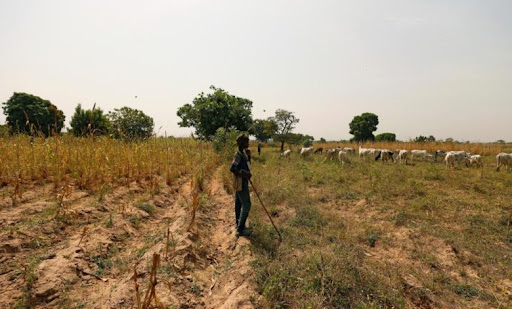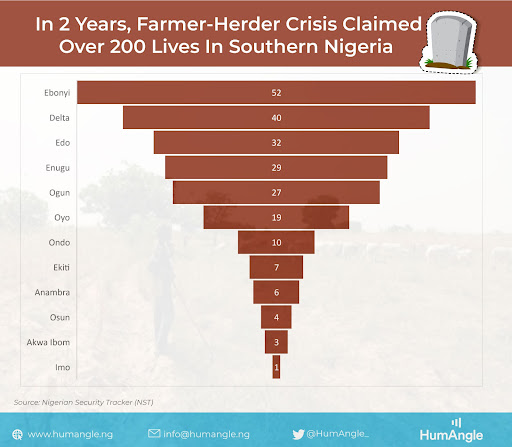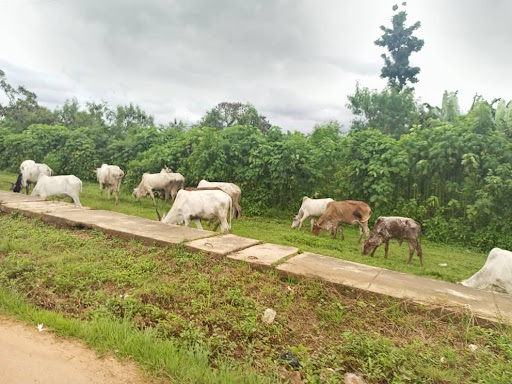In 2 Years, Farmer-Herder Crisis Claimed Over 200 Lives In Southern Nigeria
Clashes between farmers and herders have claimed over 200 lives in Southern Nigeria in the last two years.

When the 17 governors in Southern Nigeria rose from their meeting on May 11, 2021, they resolved that they all would ban open grazing in their states as a critical measure against spiralling insecurity in the region. The meeting was held in Asaba, Delta State, South-south Nigeria.
Rotimi Akeredolu, the Chairman of the Southern Governors’ Forum announced at the end of the meeting that incursion of armed herders, criminals, and bandits into the region has presented a severe security challenge for the Southern states.
Two months later, the Governors in another meeting held in Lagos, reiterated their commitment to banning open grazing and declared Sept. 1, 2021 as the deadline for all the states to legally effect the ban.
This declaration was applauded by residents and stakeholders in the region, with many expressing optimism that such a ban would end the incessant clashes between farmers and herders.
Kunle Omolaja, who had been sacked from one of his farms in the Imeko area of Ogun State said “I was excited when I heard about the resolution. I thought it meant an end to (Fulani) herdsmen grazing on our farms. But nothing has changed; you still see them grazing their cattle into people’s farms.”
215 persons killed since 2019
Clashes between farmers and herders, as well as attacks on farmers by marauding criminal herders have led to the death of at least 215 persons in Southern Nigeria between Jan. 2019 and Aug. 2021, according to data obtained from the Nigerian Security Tracker (NST) of the Council of Foreign Affairs.
The situation is dire in the country’s middle belt region where 3,641 people were killed between 2016 and 2018.
Data from NST, studied by HumAngle, reveals that Ebonyi State has the highest number of deaths resulting from attacks by criminal herders between Jan. 2019 and Aug. 2021, with 56 lives lost while one death was recorded each in Imo and Abia states.
Delta State follows Ebonyi with 40 deaths while 32 and 29 deaths were recorded in Edo and Enugu states respectively within the years under review.

7 of 17 states enact anti-open grazing law
When the deadline set by the Southern governors expired, only seven of 17 states in the region had enacted laws forbidding the practice of open grazing.
The law has been enacted in Oyo, Ekiti, Ondo, Bayelsa, Rivers, Ebonyi, and Abia states. HumAngle gathered that bills proscribing open grazing practices have been passed by houses of assembly in Lagos, Ogun, Osun, and Enugu states but the bills are yet to be assented by the governors.
The bill was passed by the Ogun State House of Assembly on July 8, 2021 while that of Enugu was passed on Sept. 2. The anti-open grazing bill in Ogun State recommends a jail term of not less than three years and possible forfeiture of livestock, for offenders.
When contacted, Kunle Somorin, the Chief Press Secretary to Dapo Abiodun, the Governor of the state, told HumAngle that the enactment process is ongoing.
“The bill has been passed and at the appropriate time we will have the full enactment. You know enactment is a process. When the bill is signed to law, all the details will be announced,” Somorin said.
Armed herders risk 21-year jail term in Lagos
The anti-open grazing bill, which was passed by the Lagos State House of Assembly on Thursday, Sept. 9, proposed a jail term of 21 years for any herder found with firearms in the state.
The bill titled, ‘Prohibition of Open Cattle Grazing Bill 2021’, was described by Mudashiru Obasa, the Speaker of the House, as timely and one that would create harmony between farmers and herders in the state. Meanwhile, the bills are still foot-dragging in the houses of assembly in Akwa Ibom, and Delta, states; while the enactment process is yet to be initiated in Edo, Imo, and Anambra states.
Charles Aniagwu, the Commissioner for Information in Delta State told HumAngle that the state’s anti-open grazing bill which is currently in the House of Assembly, “should be passed this month.”
When contacted, Crusoe Osagie, the Chief Press Secretary to Governor Godwin Obaseki of Edo State, told HumAngle that the state government was committed to implementing the resolution to ban open grazing in Southern Nigeria. He assured that the enactment process would soon commence in the state.
“It will not be a tedious process. The house of assembly and the governor have a cordial relationship. So, once they kick off, they can conclude it in a very short period of time,” Osagie stated.
However, Hope Uzodimma, the governor of Imo state, has opted out of the Southern governors’ resolution to ban open grazing.
Uzodima opted out of the resolution after meeting with President Muhammadu Buhari on Aug. 26. He disclosed that Imo State has opted for a “partnership between farmers and herders” as against a ban on open grazing.
Why open grazing law is ineffective in Oyo
An anti-open grazing law has been signed in Oyo State earlier this year, but, checks by HumAngle shows that the law is ineffective due to lack of implementation.
According to the law, open grazing of livestock in any part of the state attracts a jail term of five years or a fine of N500,000. HumAngle reliably gathered that open grazing of cattle persists in the state as there are no measures in place for the enforcement of the law.

Taiwo Adisa, the Chief Press Secretary to Governor Seyi Makinde blamed the Police for the lack of enforcement of the law. He, however, disclosed that the governor has resolved to set up a task force that would bring the law to life.
“The law is in place. The question you are asking, the governor has also asked the law enforcement agency – the Police. And because he did not get satisfactory answers, that is why he has decided to set up a taskforce – a taskforce that will implement the law,” Adisa said.
He said an announcement on the operation of the taskforce would be made soon.
Support Our Journalism
There are millions of ordinary people affected by conflict in Africa whose stories are missing in the mainstream media. HumAngle is determined to tell those challenging and under-reported stories, hoping that the people impacted by these conflicts will find the safety and security they deserve.
To ensure that we continue to provide public service coverage, we have a small favour to ask you. We want you to be part of our journalistic endeavour by contributing a token to us.
Your donation will further promote a robust, free, and independent media.
Donate HereStay Closer To The Stories That Matter




